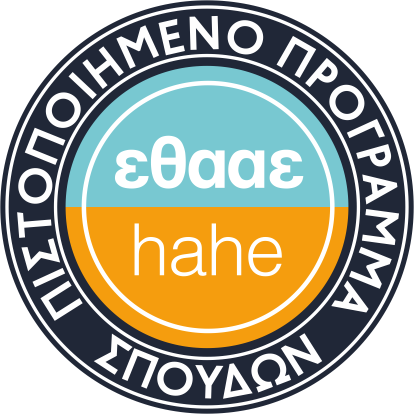Λαϊκοί Πολιτισμοί στα Βαλκάνια
Διδάσκων/ουσα: Μπομπολής Πέτρος
Κωδικός Μαθήματος: SM-0603
Τύπος Μαθήματος: Σεμινάριο
Επίπεδο Μαθήματος: Προπτυχιακό
Γλώσσα Μαθήματος: Ελληνικά
Εξάμηνο: Οποιοδήποτε Χειμερινό
Σύνολο Ωρών: 2
Erasmus: Μη Διαθέσιμο
The topics examined regard: a) the conceptualization of the terms “folk” culture , ethnicities, minorities, cultural identities, Balkans.
- b) Getting to know the nationalist ideologies and the nation states that emerged within the Balkan peninsula.
- c) The ethnic groups that live in the area, the languages they speak as well as the prevailing religious denominations.
- d) The customs and traditions of the region
- e) Modern migrations within the region.
- f) Samples of popular culture and cultural events in the area.
Upon the completion of the seminar the following objectives will have been achieved:
The contact and familiarization of the students with the culture, the language, the customs and traditions, the music, the dance, the theatre, the history of the peoples of the Balkans and their societies, will result in the approach of the mentality of the neighboring populations peoples and will contribute to the elimination of social stereotypes regarding the image of the less prominent peoples as well as the acceptance of diversity with respect for others leading to the acceptance of multicultural societies.
1st week: Introduction and conceptualization of the terms folk culture, tradition, Balkans
2nd week: About nationalist ideology, ethnicity, minority, cultural identities.
3rd week : National movements, cultural and political activities for their unification during the 19th century
4th week: Nationalities, languages and religious denominations in the area.
5th week: Samples of folk culture and cultural events from Greece
6th week: Samples of folk culture and cultural events from Turkey
7th week: Samples of folk culture and cultural events from Albania
8th week: Samples of folk culture and cultural events from Bulgaria
9th week: Samples of folk culture and cultural events from Romania
10th week: Samples of folk culture and cultural events from Serbia
11th week: Samples of folk culture and cultural events from North Macedonia
12th week: About folk clothing in the area of the Balkan peninsula
13th week: Mapping the culinary space of the Balkans
- Ε.Αυδίκος (διεύθυνση/επιμέλεια), Λαϊκοί πολιτισμοί και σύνορα στα Βαλκάνια, Εκδόσεις Πεδίο 2010
-Ε.Αυδίκος ,Εισαγωγή στις σπουδές του λαϊκού πολιτισμού .Λαογραφίες, λαϊκοί πολιτισμοί, ταυτότητες,Εκδόσεις Κριτική 2009
-Ε.Αυδίκος, Πανηγύρια και χορευτικοί όμιλοι .Βίωση και αναβίωση της παράδοσης. Στο Χορευτικά ετερόκλητα (σελ.203-212),Εκδόσεις Ελληνικά Γράμματα 2004
-M.Todorova,Βαλκάνια η Δυτική φαντασίωση, Εκδόσεις Παρατηρητής 2000
-Μ.Μαζάουερ, Τα Βαλκάνια, Εκδόσεις Πατάκη 2000
-Μ.Νυσταζοπούλου-Πελεκίδου, Οι βαλκανικοί λαοί, Εκδόσεις Βάνιας 2000
-Γ.Δελαστίκ, Το τέλος των Βαλκανίων, Εκδοτικός οίκος Α.Λιβάνη 2008
-Μ.Κοππά, Οι μειονότητες στα μετα-κομμουνιστικά Βαλκάνια
-Ε.Ζάχος-Παπαζαχαρίου/Α.Ιωαννίδου/Ι.Μιχαηλίδης, Γλώσσες, αλφάβητα και εθνική ιδεολογία στην Ελλάδα και τα Βαλκάνια, Εκδόσεις Κριτική και ΚΕΜΟ 1999.
- K.J Cowan, Η πολιτική του σώματος.Χορός και ταυτότητα στη βόρεια Ελλάδα. Μτφ Κ.Κουρεμένος. Εκδόσεις Αλεξάνδρεια 1998 (1990)
-Ζ/Π Λιεζουά ,Ρομά, Τσιγγάνοι ταξιδευτές .Οι Τσιγγάνοι της Ευρώπης. Μτφ .Α .Σιπητάνου, Εκδόσεις Καστανιώτης 1999
-Κ.Μάρκου,Τα πομάκικα και η χρήση τους από τους Πομάκους της ελληνικής Θράκης.Πρακτικά 23ης ετήσιας συνάντησης του Τομέα Γλωσσολογίας του τμήματος Φιλολογίας του Α.Π.Θ (σελ.267-276),Θεσσαλονίκη 2003
-Σ. Τρουμπέτα, Κατασκευάζοντας ταυτότητες για τους μουσουλμάνους της Θράκης. Το παράδειγμα των Πομάκων και των Τσιγγάνων.Εκδόσεις Κριτική-ΚΕΜΟ 2001
-E.J.Hobsbawm,Eθνη και εθνικισμός από το 1780 μέχρι σήμερα,Εκδόσεις Καρδαμίτσα 1994
-Ε.Gellner,Eθνη και εθνικισμός,Εκδόσεις Αλεξάνδρεια 1992
-B.Anderson ,Imagined Communities: Reflections on the Origin and Spread of Nationalism,London 1983
-Π.Λέκκας ,Η εθνικιστική ιδεολογία: πέντε υποθέσεις εργασίας στην ιστορική κοινωνιολογία, Εκδόσεις Κατάρτι 1996
-Π.Λέκκας ,Το παιχνίδι μα το χρόνο.Εθνικισμός και νεωτερικότητα.Εκδόσεις Ελληνικά Γράμματα 2001
Face to face or distance learning
Use of ICT in teaching
Short answer and development questions through discussion as well as the presentation of a short assignment
Επιστροφή
Προπτυχιακό
Γραμματεία
Κτίριο «Γαληνός» (1ος όροφος)
49132 Κέρκυρα
Εξυπηρέτηση κοινού-φοιτητών:
Δευτέρα, Τετάρτη, Παρασκευή: 11:00-13:00
Τρίτη, Πέμπτη: 11:00-13:00 (Erasmus+)
 Πλατφόρμα eClass
Πλατφόρμα eClass
 Ηλεκτρονική Γραμματεία
Ηλεκτρονική Γραμματεία
 Ηλεκτρονικό ταχυδρομείο
Ηλεκτρονικό ταχυδρομείο
 Διαχείριση συγγραμμάτων
Διαχείριση συγγραμμάτων
 Κόμβος Πρακτικής Άσκησης
Κόμβος Πρακτικής Άσκησης
 Βιβλιοθήκη
Βιβλιοθήκη





 Λαϊκοί Πολιτισμοί στα Βαλκάνια
Λαϊκοί Πολιτισμοί στα Βαλκάνια

